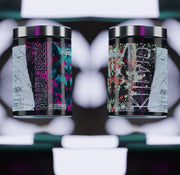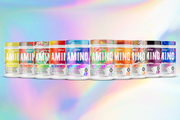
The prevalence of brain and neurological disorders have reached the highest amount in our history and are steadily increasing. Anxiety, depression, brain fog, Alzheimer's, and Parkinson’s are just a handful of the brain problems affecting nearly everyone globally, and carrying a high burden to the patients and their families.
While these conditions are extremely complex, nootropics may serve as a promising tool to level-up our brains. Nootropics—or “smart drugs”—is an umbrella term for supplements or compounds that may enhance cognitive performance and protect the brain from deterioration over time.
Nootropics can be natural or man-made (i.e. Ritalin and Adderrall), but we gravitate towards the kind we can find in Mother Nature. Three nootropic superfoods that we’re obsessed with are sunflower lecithin, lion’s mane mushroom powder, and gingko biloba. Let’s explore what they bring to the table.
Sunflower Lecithin: More Than Meets Than Eye
You might recognize lecithin as a popular food emulsifier, but did you know it actually has profound health benefits? Lecithin is a fatty substance that makes up one-third of our brain, so this should give you some perspective on just how important this nutrient is.
Lecithin can be naturally found in a variety of different sources including soybeans, egg yolks, and meat products, but sunflower seeds are the safest source. This is because sunflower seeds are never genetically-modified and the lecithin extraction process doesn’t require the use of harsh chemicals.
Sunflower lecithin contains a natural source of choline—an essential nutrient for prime brain and nervous system health. Choline is a precursor to acetylcholine, which is a neurotransmitter that plays a significant role in learning and memory.
Perhaps this explains the findings of a study published in the American Journal of Clinical Nutrition, which suggests that a higher choline intake is linked to improved memory performance and cognitive function.
Cognition is Lion’s Mane’s Game
Medicinal mushrooms are gaining widespread notoriety among the masses, but they’ve been used in Traditional Chinese Medicine (TCM) for centuries. Lion’s mane mushroom is highly-valued for its neuroprotective and brain-boosting properties.
In a 2015 study, researchers discovered that lion’s mane mushroom (Hericium erinaceus) treatment with chick embryos “triggered neurite outgrowth at 20.47%, 22.47%, and 21.70% in brain, spinal cord, and retinal cells.” Neurite outgrowth is the extension (growth) of axons and dendrite from neurons (basic working unit of the brain). This positive mechanism could potentially slow down or reverse cell degeneration in the brain.
While the above mentioned study was conducted on animals, there’s a particular double-blind placebo-controlled clinical trial performed with humans. 50 to 80-year-old men and women suffering mild cognitive impairment were split into two even groups. One group received 1,000mg tablets containing 96% of lion’s mane mushroom powder three times a day during a 16-week period, and the other group received a placebo.
The lion’s mane mushroom group showed improvements in cognitive function when compared with the placebo group. However, it’s important to note that their results decreased significantly when they stopped supplementation after the 16-week trial.
Lion’s mane may also help those suffering from depression and anxiety, according to Japanese researchers from the Department of Clinical Psychology at Kyoto Bunkyo University. Their research focused on thirty women who were given either lion’s mane or a placebo for four weeks.
They concluded that “that HE intake has the possibility to reduce depression and anxiety and these results suggest a different mechanism from NGF-enhancing action of H. erinaceus.”

Think Better With Gingko Biloba
Gingko biloba extract is derived from the leaves of the gingko tree. This potent herb has been extensively studied for its brain health benefits, including improved mood, cognition, memory, and focus.
A 24-week randomized controlled trial was conducted on 404 patients suffering from “mild to moderate dementia (SKT 9-23), Alzheimer's disease (AD), or vascular dementia (VaD).” The control group received a placebo and the test group was given 240mg of Ginkgo biloba extract EGb 761® per day. The Short Cognitive Performance Test (Syndrom-Kurztest, SKT) is a common test used to measure cognitive decline. Test results indicated that the test group (gingko supplementation) showed superior improvements in cognitive and neuropsychiatric symptoms than the controlled placebo group.
In another German study, outcome data showed an increase in quality of life, motor performance, mental and emotional health in healthy adults who supplemented with gingko during a four-week period.
Neuroprotection Has Never Been Easier
The best part about natural nootropics is that you can easily incorporate them into your daily regimen. Luckily for you, you can find sunflower lecithin, lion’s mane, and gingko biloba in our GREENS Superfood Powder. Just add a scoop in your favorite smoothie or recipe for an instant brain boost!

Want to learn more about GREENS Superfood Powder? You might like this article here.








37 comments
ZDKhgMJszWQcw
bINWAEZzkXxQF
npOhgDCblPML
GlrJiRYKHzIO
yPCDGRMSJFl
Leave a comment